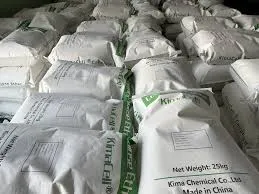
Nov . 19, 2024 15:44 Back to list
hydroxyethyl cellulose manufacturer
Understanding Hydroxyethyl Cellulose A Key Component from Manufacturers
Hydroxyethyl cellulose (HEC) is a non-ionic, water-soluble polymer derived from cellulose. It is widely used in various industries, including pharmaceuticals, cosmetics, and construction, due to its unique properties. Manufacturers play a crucial role in producing high-quality HEC to meet the diverse needs of consumers and industries.
What is Hydroxyethyl Cellulose?
HEC is created through the hydroxyethylation of cellulose, resulting in a modified cellulose polymer. Its colorless and odorless form allows it to be used in applications where aesthetics and purity are important. HEC possesses excellent thickening, dispersing, and stabilizing properties, making it a versatile ingredient in formulations.
One of the defining characteristics of HEC is its solubility in both hot and cold water, providing flexibility in various formulations. When dissolved, it forms a viscous solution that helps maintain stability, improving texture and application characteristics of products.
Applications in Industries
The applications of hydroxyethyl cellulose span multiple sectors
1. Pharmaceuticals In the pharmaceutical industry, HEC is utilized as a thickening agent in oral suspensions and topical formulations. Its ability to control viscosity enables consistent drug delivery, enhancing patient compliance.
2. Cosmetics and Personal Care HEC is prevalent in cosmetic formulations such as creams, gels, and lotions. It serves to improve the texture and stability of products, ensuring an even application and pleasant sensory experience for consumers. Additionally, HEC functions as an emulsifier, helping to blend oil and water components in formulations.
hydroxyethyl cellulose manufacturer

3. Construction In the construction industry, HEC is used in tile adhesives, cement, and plaster. Its thickening properties enhance workability and adhesion, making it an essential additive in building materials. HEC also helps to retain moisture, allowing for improved curing and performance of construction products.
4. Food Industry Some manufacturers produce food-grade HEC, which is employed as a thickener or stabilizer in various food products, improving texture and shelf stability.
Quality Control and Manufacturing Processes
The manufacturing of hydroxyethyl cellulose involves several critical steps, including the selection of high-purity cellulose, hydroxyethylation, and purification. Quality control is paramount throughout the production process. Manufacturers typically adhere to strict industry standards to ensure that the HEC produced meets the necessary specifications for purity, viscosity, and performance.
Sophisticated technology and laboratory testing are essential in monitoring the properties of HEC. Characterization tests, including rheological studies, ensure that the final product performs as required in the intended application.
Additionally, transparency in sourcing raw materials and sustainable production practices is becoming increasingly important among consumers and regulatory bodies. Leading manufacturers are investing in eco-friendly processes to meet the demand for sustainable products without compromising on quality.
Conclusion
Hydroxyethyl cellulose is an indispensable polymer with a wide range of applications across various industries. As a product of meticulous manufacturing processes, high-quality HEC contributes to the effectiveness and appeal of countless formulations. Manufacturers dedicated to innovation and quality control are essential in meeting the growing demands for HEC, driving advancements in numerous sectors from healthcare to construction. As industries evolve, the role of HEC will continue to expand, reinforcing its status as a cornerstone of modern formulation chemistry.
-
Versatile Hpmc Uses in Different Industries
NewsJun.19,2025
-
Redispersible Powder's Role in Enhancing Durability of Construction Products
NewsJun.19,2025
-
Hydroxyethyl Cellulose Applications Driving Green Industrial Processes
NewsJun.19,2025
-
Exploring Different Redispersible Polymer Powder
NewsJun.19,2025
-
Choosing the Right Mortar Bonding Agent
NewsJun.19,2025
-
Applications and Significance of China Hpmc in Modern Industries
NewsJun.19,2025







